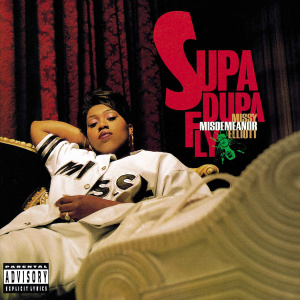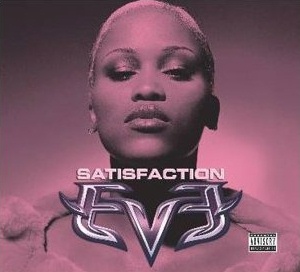
Dana Elaine Owens, known professionally as Queen Latifah, is an American rapper, actress, and singer. Born in Newark, New Jersey, she signed with Tommy Boy Records in 1989 and released her debut album All Hail the Queen on November 28, 1989, featuring the hit single "Ladies First". Nature of a Sista' (1991) was her second and final album with Tommy Boy Records.

Melissa Arnette Elliott is an American rapper, singer, and record producer. She embarked on her music career with R&B girl group Sista in the early-mid 1990s and later became a member of the Swing Mob collective along with childhood friend and longtime collaborator Timbaland, with whom she worked on projects for American R&B acts Aaliyah, 702, Total, and SWV. Following several collaborations and guest appearances, she launched her solo career in 1997 with her debut album Supa Dupa Fly, which spawned the top 20 single "Sock It 2 Me". The album debuted at number three on the Billboard 200, the highest charting debut for a female rapper at the time.
The Grammy Award for Best Rap Album is an award presented to recording artists for quality albums with rapping at the Grammy Awards, a ceremony that was established in 1958 and originally called the Gramophone Awards. Honors in several categories are presented at the ceremony annually by the National Academy of Recording Arts and Sciences of the United States to "honor artistic achievement, technical proficiency and overall excellence in the recording industry, without regard to album sales or chart position".
The Grammy Award for Best Female Rock Vocal Performance was an award presented at the Grammy Awards, a ceremony that was established in 1958 and originally called the Gramophone Awards, to female recording artists for works containing quality vocal performances in the rock music genre. Honors in several categories are presented at the ceremony annually by the National Academy of Recording Arts and Sciences of the United States to "honor artistic achievement, technical proficiency and overall excellence in the recording industry, without regard to album sales or chart position".
The Grammy Award for Best Contemporary R&B Album was an honor presented at the Grammy Awards, a ceremony that was established in 1958 and originally called the Gramophone Awards, to recording artists for quality works on albums in the contemporary R&B music genre. Honors in several categories are presented at the ceremony annually by the National Academy of Recording Arts and Sciences of the United States to "honor artistic achievement, technical proficiency and overall excellence in the recording industry, without regard to album sales or chart position".
The Grammy Award for Best Rap Performance is an honor presented to recording artists for quality rap performances. It was first presented at the 31st Annual Grammy Awards in 1989 and again at the 32nd Annual Grammy Awards in 1990, after which point the award was split into two categories: Best Rap Solo Performance and Best Rap Performance by a Duo or Group. These two categories were combined again in 2012 as a result of a restructure of Grammy categories, and the reinstated Award for Best Rap Performance was presented at the 54th Grammy Awards in 2012. The restructuring was the consequence of the Recording Academy's wish to decrease the number of categories and awards and to eliminate distinctions between solo and duo or group performances.
The Grammy Award for Best Male Rap Solo Performance was an honor presented to male recording artists at the 45th Grammy Awards in 2003 and the 46th Grammy Awards in 2004 for quality rap solo performances. The Grammy Awards, an annual ceremony that was established in 1958, and originally called the Gramophone Awards, are presented by the National Academy of Recording Arts and Sciences of the United States to "honor artistic achievement, technical proficiency and overall excellence in the recording industry, without regard to album sales or chart position".
The Grammy Award for Best Melodic Rap Performance is an honor presented at the Grammy Awards, a ceremony that was established in 1958 and originally called the Gramophone Awards, to recording artists for quality songs on which rappers and singers collaborate. Honors in several categories are presented at the ceremony annually by the National Academy of Recording Arts and Sciences of the United States to "honor artistic achievement, technical proficiency and overall excellence in the recording industry, without regard to album sales or chart position".

Supa Dupa Fly is the debut studio album by American rapper Missy "Misdemeanor" Elliott, released July 15, 1997, on The Goldmind and Elektra Records. The album was recorded and produced solely by Timbaland in October 1996, and features the singles, "The Rain ", "Sock It 2 Me", "Hit Em wit da Hee" and "Beep Me 911". Guest appearances on the album include Busta Rhymes, Ginuwine, 702, Magoo, Da Brat, Lil' Kim, and Aaliyah. The album was recorded in just two weeks.

The Cookbook is the sixth studio album by American rapper Missy Elliott, released on July 4, 2005, by The Goldmind Inc. and Atlantic Records in Germany and the United Kingdom, and on July 5 in the United States and Japan.

"Lose Control" is a song by American rapper Missy Elliott featuring singer Ciara and rapper Fatman Scoop. It was released as the lead single from Elliott's sixth studio album, The Cookbook, on May 23, 2005. It contains samples from Hot Streak's "Body Work" and Cybotron's "Clear". The song peaked at number three on the Billboard Hot 100 in the United States, number two in New Zealand, and in the top thirty in various countries.

"Satisfaction" is a hip-hop song by American rapper-songwriter Eve, released on February 25, 2003 as the second and final single from the album, Eve-Olution (2002). Co-produced by Dr. Dre and his then-protégé Mike Elizondo, it was one of the last songs that Eve added to the final track listing of her album.






